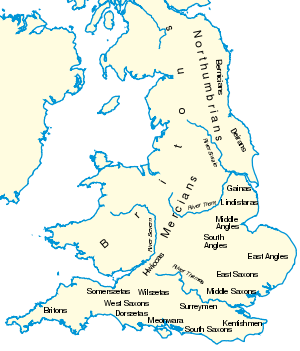 |
| The various Anglo-Saxon kingdoms |
According to Bede, Æthelbert (c. 560 – 24 February 616) was the third of eight kings to be a bretwalda. In context, it is clear that it refers to a ruler who holds sway over various Anglo-Saxon kingdoms. The term is used by various authors, but is spelled differently. Remember that, at the time, there would be no universal education that would ensure "standard spelling" among all Anglo-Saxon writers. So some manuscripts describing the same status use Bryten-wealda or Breten-anweald.
Because we are talking about Britain, the reader who knows no Anglo-Saxon might hazard a guess that the bret/bryt- root refers to "Britain" and weald might have something to do with "wield" as in "to wield power." This would be an excellent guess, and satisfied scholars for a long time.
One king however, Æthelstan, was referred to as brytenwealda ealles ðyses ealondes, which is best translated as "ruler of all these islands." If brytenwealda already meant "Britain-ruler" there would be no need for the rest of the phrase referring to "all these islands."
The likeliest source of the bret/bryt- root is now thought to the verb breotan which means "to break" or "to disperse." The origin of the phrase used to describe the kings who rule over more than their local kingdom therefore refers to their rule over the "broken" or widely dispersed territories of the Anglo-Saxons. The resemblance to the word "Brit" is coincidental.
A step closer to a true King of all Britains would wait until the late 9th century with King Alfred the Great.
No comments:
Post a Comment
Note: Only a member of this blog may post a comment.